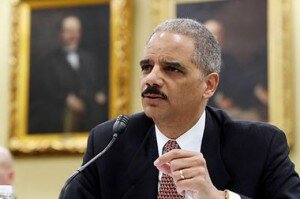Eric Holder: US does not expect to capture Osama bin Laden alive
 Attorney General Eric Holder said the possibility of capturing Osama bin Laden alive is ‘infinitesimal.’ He spoke in response to sharp questioning Tuesday by House Republicans about prospective risks of some day putting the Al Qaeda leader on trial in a US civilian court.
Attorney General Eric Holder said the possibility of capturing Osama bin Laden alive is ‘infinitesimal.’ He spoke in response to sharp questioning Tuesday by House Republicans about prospective risks of some day putting the Al Qaeda leader on trial in a US civilian court.
The Obama administration does not expect to capture Osama Bin Laden alive.
Attorney General Eric Holder told a House appropriations subcommittee on Tuesday that the possibility of catching the Al Qaeda leader alive is “infinitesimal.â€
“Based on the intelligence I’ve reviewed, the possibility simply does not exist,†Mr. Holder said in response to heated questioning by Republican members of Congress.
“He will be killed by us or he will be killed by his own people so that he is not captured alive,†Holder said. “We know that.â€
The exchange came amid a barrage of questioning by Republican lawmakers critical of what they suggested was a lackluster approach to terrorism by an Obama administration that they say views the Al Qaeda challenge more as crime fighting than war fighting.
Amid hostile questioning, the attorney general also pledged that 9/11 mastermind Khalid Sheikh Mohammed would never be released from US custody.
He made the assertion after being asked what the administration would do if a civilian judge ordered Mr. Mohammed released.
“If that were to be the case, he would not be released,†Holder said. “I am not qualifying it. He would not be released.â€
The comment seems to contradict the administration’s announced rationale for holding public trials for Mohammed and other terror suspects in civilian courts. Officials had said they wanted to demonstrate that Mohammed could face a fair trial under the American system of justice. But a trial that does not offer the possibility of acquittal is a show trial and the antithesis of justice.
Law allows indefinite detention
A law Congress passed in 2001 authorizes the administration under the law of war to detain indefinitely those who are deemed enemy combatants. Holder said, if necessary, the administration would use that authority to keep Mohammed behind bars.
“So why are we trying him? Am I missing something?,†asked Rep. John Culberson (R) of Texas. Why put him on trial if the government is going to hold him anyway, he asked.
“You are dealing with a hypothetical that is not going to happen,†Holder countered. He said federal prosecutors would be able to build a solid case and win a conviction against Mohammed through voluntary statements he’s made that can be used against him in court.
Congressman Culberson persisted. “The approach of the Obama administration is that this is a law enforcement action – it is not, we are at war,†said Culberson. “Texans understand that when you are at war the goal is to hunt down your enemy and either kill them or capture them.â€
Holder responded that he was aware that the nation was at war. But he added that the administration’s plan to place some terror suspects on trial in civilian federal courts was an important tool in the broader waging of that war.
Holder a target of GOP over national security issues
Holder has been under fire by Republicans in Congress who have used him as a target to try to paint the administration as weak on national security issues. The attorney general announced last year that the suspected 9/11 mastermind and four other terror suspects would be tried in federal court in downtown New York City. But that decision was later rescinded amid local opposition and Republican criticism.
It remains unclear whether Mohammed and the others will be tried in a civilian court or instead face a military tribunal.
The administration and Holder have also come under Republican fire for pledging to close the terror prison camp at Guantánamo Bay, Cuba, and for the quick application of Miranda warnings for the alleged Christmas Day bomber.
Holder defended the decision to issue Miranda warnings to the Christmas Day bomber after about 50 minutes of questioning. “There was a pretty substantial amount of information received from him that proved to be actionable, that proved to be timely,†Holder said.
The attorney general said that providing legal counsel to a suspect can sometimes facilitate faster cooperation. He said a lawyer is able to quickly assess a suspect’s options and offer advice that unless the individual wants to spend the rest of his life in a supermax prison he’d better start cooperating.
“What is your proof that if he was whisked off to a military facility and questioned that the information would be more voluminous and better,†Holder asked his critics. He said some psychologists suggest that bringing Al Qaeda suspects into the custody of uniformed military personnel might prompt them to behave more like closed-mouth warriors.
____
CSMonitor
Comments
comments
 Calendar
Calendar


































